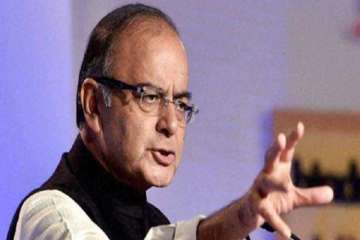High growth necessary for poverty alleviation, says Arun Jaitley
Banks, especially public sector banks, opened 330 million accounts under the Pradhan Mantri Jan Dhan Yojana (PMJDY) in a few months, he said.

A high rate of growth is necessary to alleviate poverty and ensure that benefits of development reach the poor, Finance Minister Arun Jaitley said on Thursday.
Addressing the 25th World Congress of Savings and Retail Banks here, he also said an aspirational society cannot wait indefinitely for the benefits of growth to improve the quality of life of the poor.
"Economies like ours all over the world need a high rate of growth. We want to use growth as a mechanism to pull the maximum number of people out of poverty, improve upon quality of life but we are conscious of the fact that dangers of development and progress benefiting a few and leaving many others out of inclusion system are also there," he said.
Therefore, he said, "the penetration effect of growth will certainly take place but it will be a slow process and aspirational society is not willing to wait indefinitely."
Talking about the financial inclusion drive of the Narendra Modi government since 2014, he said the ultimate objective was to bank the unbanked, secure the unsecured, fund the unfunded and service the unserviced areas.
Banks, especially public sector banks, opened 330 million accounts under the Pradhan Mantri Jan Dhan Yojana (PMJDY) in a few months, he said.
Initially, it was zero balance accounts and gradually people started putting in money.
To incentivise operational accounts, he said an overdraft facility was provided to them.
Noting that India predominately is an uninsured and unpensioned society, he said the government offered insurance at very affordable premium as part of the social security system through the PMJDY account.
A total of 141 million people are enrolled under accident insurance while 55 million have availed life insurance under the scheme, he said.
Besides, a low premium pension policy called Atal Pension Yojana was launched, targeted at providing sustenance pension after 60 years of age.
For funding the unfunded, the government introduced the Mudra scheme.
Once these accounts became operational, he said the government moved towards formalising and digitising the economy.
"To formalise the economy, the government demonetised high value currency which compelled people to put all their cash into the banking system," he said.
The government also introduced a new taxation regime -- the Goods and Services Tax (GST) -- where multiple taxes were combined into one, he said, adding the tax system became completely online and brought many activities into the formal system.
This is still work on progress, Jaitley added.
Speaking at the occasion, Financial Services Secretary Rajiv Kumar said enthused by the success of PMJDY, the government recently launched its second phase with a target of providing bank accounts to all individuals and doubling overdraft facility to Rs 10,000.